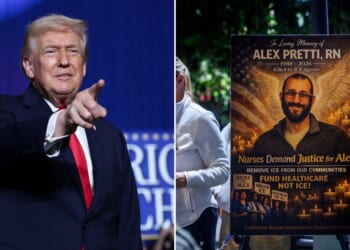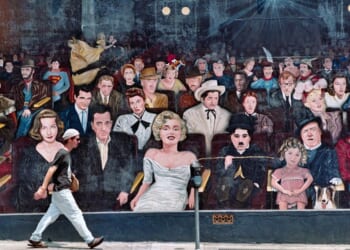It must recognize the thick foundation of anthropology and moral order underlying the law.
Today’s conservative legal movement is the proverbial dog that caught the car. After years of effort (and more than a little fortuity), a solidly conservative majority now sits on the Supreme Court. The movement has racked up a string of wins on longstanding priorities, ranging from affirmative action to abortion to administrative agency deference, with perhaps the most seismic changes still to come. The Court’s blessing of the long-theorized “major questions doctrine,” which grants courts broad power to deem a particular action outside the purview of administrative agencies and properly committed to Congress, is a blade perfectly forged for dismantling that perennial movement bogeyman, the administrative state.
So where do things go from here?
The conservative legal movement must now turn its efforts toward developing a substantive anthropology—that is, it must have a more rooted account of the human person who is the subject of law. Past Supreme Court precedents, after all, reveal a deeply inconsistent picture. Sometimes, the subject of law is a figure conscience-bound to God and the moral order he created; other times, he is Justice Anthony Kennedy’s self-crafting subject. Sometimes, he is homo economicus, a rational preference-maximizer; other times, he stands buffeted by the winds of corporate power. Sometimes her biology matters; sometimes it doesn’t.
Of course, these questions have been debated by theologians, philosophers, and jurists for centuries. But the complexity of that history does not absolve today’s conservative lawyers and judges from grappling with the matter. When courts make decisions, they cannot help but pronounce on the most consequential questions of human existence, whether or not they realize it.
In some areas, such as the nature of unborn personhood, the meaning of sexual orientation, and the distinction between gender and sex, these anthropological questions are well-trodden ground. But what about when they implicate other domains of law, particularly where corporate power is concerned? After all, for decades there have been close ties between the conservative legal movement and the deregulatory agenda favored by modern business firms. “Deconstructing the administrative state” is a normative priority that serves not merely the interests of constitutional purists, but also corporate shareholders.
Corporations Are Not People
In many quarters, it is received wisdom that the modern business corporation is a sort of “person” legally equivalent to an embodied human being, and possessing many of the same rights. That principle was most famously enshrined in the Supreme Court’s notorious Citizens United ruling, which recognized that corporations enjoy First Amendment speech rights of their own. Many conservatives applauded that ruling at the time, viewing it as a triumph of free speech against an overbearing state. But today, this same logic is regularly invoked by companies seeking to shield themselves from accountability for disseminating online content that harms young people.
Citizens United is very difficult to defend on originalist grounds. At the time of the Founding, organized business corporations were few and far between, and required charters from the government in order to operate. It was self-evident that they possessed only those powers specifically enumerated in their constitutive charters—not a broad range of “rights” traditionally associated with the nature of human beings. The modern understanding of corporate personhood is a construction of positive law, not metaphysics. It is not in any sense “conservative.”
An ahistorical, metaphysically unsound understanding of corporate personhood has had ripple effects in other areas of the law. Throughout American history, human beings have passed laws to serve the interests of embodied human beings—including, notably, antitrust laws. Where business corporations engage in anticompetitive conduct that harms the interests of flesh and blood consumers, the state has the power to prevent that conduct and restore marketplace competition. In some cases, that means breaking up large firms. And to be clear, this is not some modern concern. There is ample historical precedent—including even theological precedent—for antitrust enforcement as a means of serving the human good.
And yet, despite the fact that Congress passed them, courts have widely treated many antitrust laws as implicitly illegitimate. They are generally viewed as infringing on corporate prerogatives to maximize their own profits, or frustratingly unpredictable wildcards that corporations can’t plan around. The history of antitrust law, as Daniel Crane has observed, is in many ways a history of courts watering down laws Congress passed to serve human interests in favor of “competing demands for efficiency and industrial progress.”
Here, a curious paradox appears. Where the rights of business corporations are concerned, core methodological commitments of the conservative legal movement—originalism in the case of the First Amendment, textualism in the case of antitrust laws—have been deprioritized on pragmatic or purposive grounds. That is exactly the sort of outcome that the movement was ostensibly created to counteract. Correcting course will require a re-grounding in a conservative understanding of human nature and its centrality to the law.
Guardians of the Polity
Moving from theory to praxis, the movement’s judicial selection processes should reflect a deeper and more thoroughgoing understanding of the range of human goods worth fighting for in a public context. In some cases, that means more comprehensive education. When I interviewed judicial candidates while serving on the Senate Judiciary Committee, I was astounded to find that most had no familiarity whatsoever with antitrust law, beyond maybe a few talking points handed down from the libertarian “law and economics” movement.
The issue also implicates judicial recruitment. At present, many judicial candidates in the conservative legal movement are recruited from a handful of top-flight law firms or litigation boutiques, in which conservative lawyers draw handsome salaries for representing (primarily) business interests in high-stakes cases. Of course, businesses are legally entitled to mount the best case possible. But that is a different question from whether this incentive structure—one that often deters ambitious conservative attorneys from pursuing more clearly conservative ends—is in fact optimal. The movement should be as keen to elevate full-time religious liberty litigators and conservative labor-side lawyers as it is to promote litigation partners at white-shoe firms.
To illustrate the point: my good friend Josh Divine, recently appointed to the U.S. District Courts of the Eastern and Western Districts of Missouri, exemplifies the sort of candidate the movement should promote. Having served as a law clerk for Judge William Pryor on the Eleventh Circuit Court of Appeals and Justice Clarence Thomas on the U.S. Supreme Court, he was well-positioned for a highly lucrative path (Supreme Court clerk signing bonuses at major law firms now average nearly half a million dollars). Instead, he pursued several years of service to then-Missouri Attorney General, and later U.S. Senator, Josh Hawley—forgoing the fat bonus—before serving as Missouri’s solicitor general, the state’s top appellate attorney.
That is the sort of value-driven career path, oriented toward deeply human ends, that the conservative legal movement should increasingly seek to reward. It is a model of, as Jesse Merriam rightly notes, “how lawyers and courts can serve not merely as guardians of rights, but as guardians of our social order.”
Reining in AI
In this same humanizing spirit, judges should resist the temptation of technological “shortcuts” that promise to circumvent the faculty of human judgment—Aristotle’s phronesis, or practical reason—that is so integral to the reality of adjudication. To that end, the conservative legal movement should be at the forefront of holding attorneys (or law clerks) accountable who, through error or intention, employ generative artificial intelligence that invents false quotations and citations in legal filings or draft opinions. It is hard to imagine anything more destructive to the fabric of the common law—a body of accumulated precedent over time, representing the working-through of complex human problems spanning the course of centuries—than precedent leavened with false citations that are disconnected from reality. The misuse of generative artificial intelligence in law is a fundamental betrayal of the legal tradition itself, and should be treated as such. It is not a peripheral concern, but an existential one.
Judges should likewise be wary of “corpus linguistics” tools that aim to offer quasi-quantitative answers to questions of constitutional or statutory interpretation—that is, quintessentially qualitative questions. Few jurists (and fewer clerks) are trained in how to properly deploy these research instruments in chambers. And still fewer are capable of cogently articulating their research processes in ways likely to prove replicable by reviewing courts or parties. In most cases, corpus linguistics tools tempt judges to “solve” the challenges of originalist or textualist methodologies by sidestepping the very human business of hermeneutics. That is a wrongheaded, and non-conservative, instinct.
Today, the conservative legal movement stands more triumphant than its originators likely ever imagined. Where things go from here is a very unsettled question. Those in the movement must recognize that originalist and textualist methodologies are not sufficient alone, but necessarily rest upon a thick foundation of anthropology and moral order that grounds their normativity. That is how to safeguard, as Merriam puts it, “the fragile ecology of a nation” that we conservatives cherish.

















